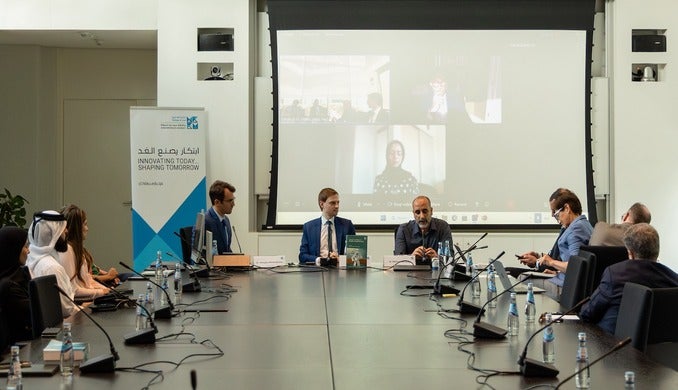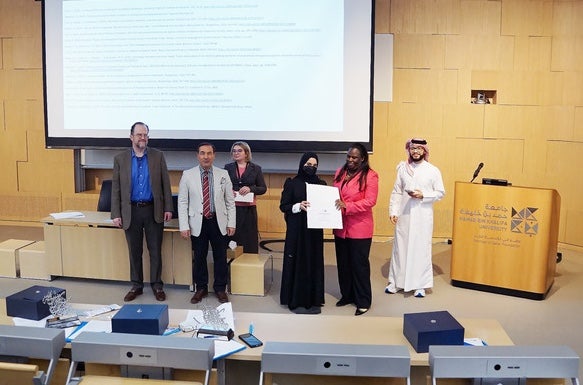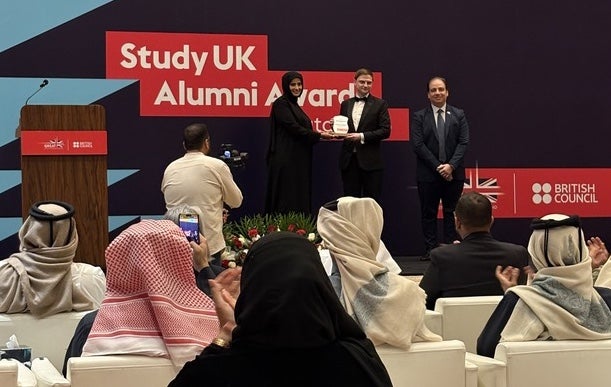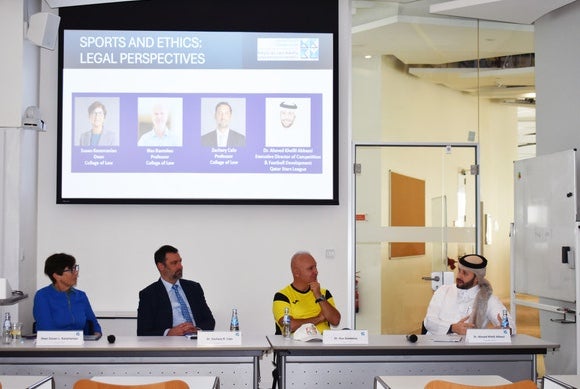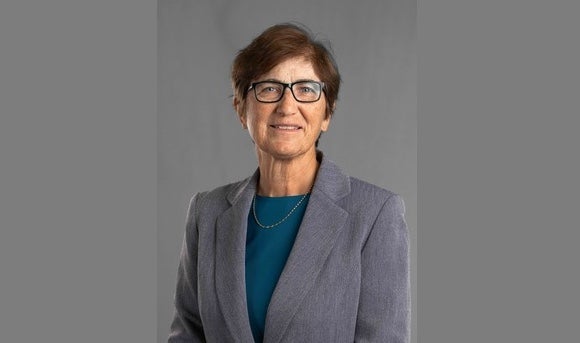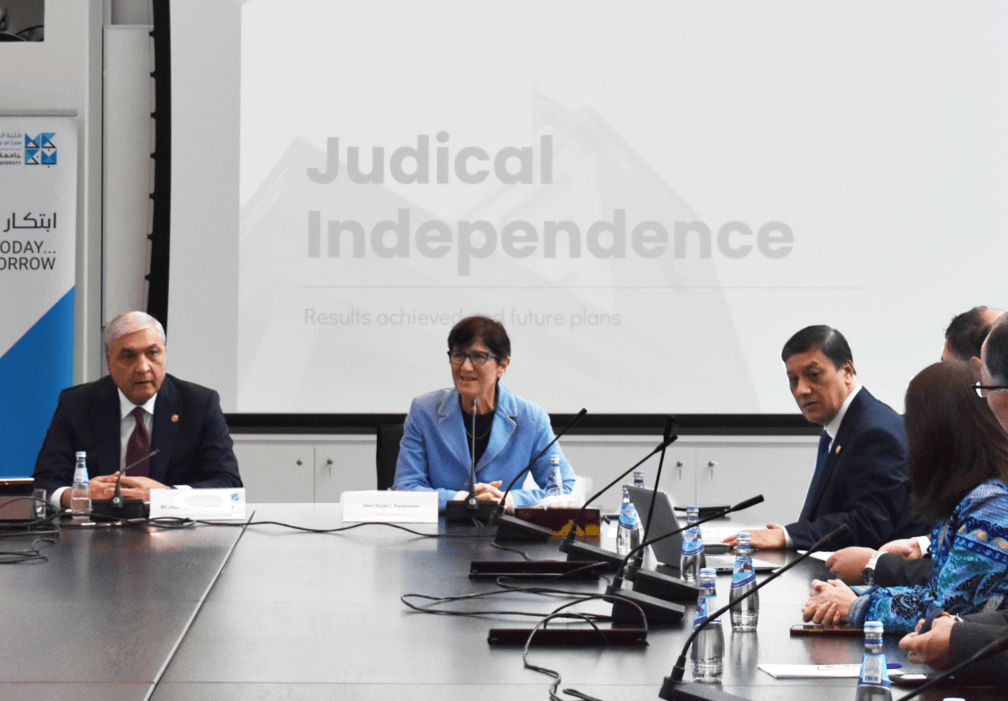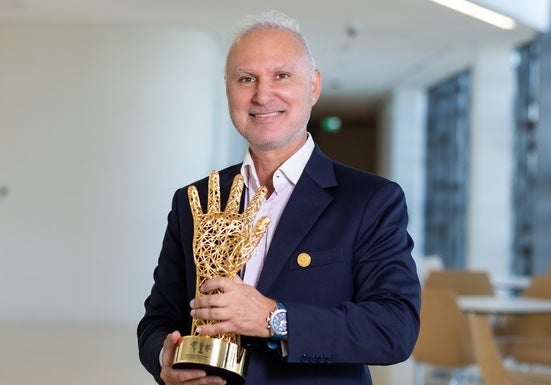
UNCITRAL, HBKU’s College of Law Co-Host Seminar on International Trade Law in the MENA Region
International experts also discuss potential harmonization of technology-related dispute resolution throughout the Arab World
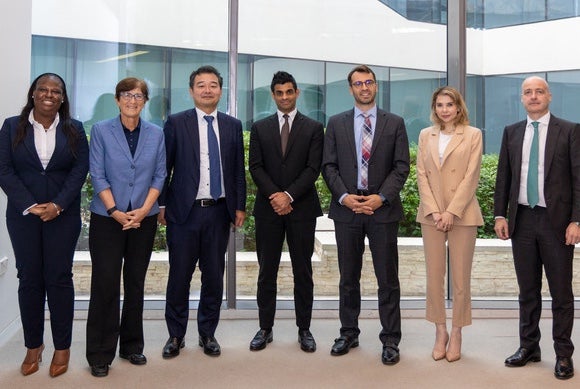
Hamad Bin Khalifa University’s (HBKU) College of Law and the UN Commission on International Trade Law collaborated to host a seminar to discuss how technology-related dispute resolution in the Middle East and North Africa can be enhanced.
The session is part of UNCITRAL’s Days in the Arab States 2024 initiative, which is held under the theme “The role of UNCITRAL in the modernization of international trade law in the Arab States.”
Esteemed experts participated, including Maha Al-Saadi, Head of Regulatory Affairs, Qatar Financial Centre; Takashi Takashima, Legal Officer, International Trade Law Division, UNCITRAL; Umar Azmeh, Registrar, Qatar International Court & Dispute Resolution Centre (QICDRC); and Matthew Heaton, Partner, Head of Office, and Head of Banking & Finance, Qatar Al Tamimi & Co.
Susan L. Karamanian, Dean, HBKU’s College of Law, moderated the panel, which highlighted how the Arab World could benefit from harmonization in this field as it seeks to foster a thriving digital single market. They also discussed how generative artificial intelligence, blockchain, and crypto assets have added layers of complexity to the field of trade law and explored the unique dispute resolution needs of startups in the regional tech sector.
Noting the value of the discussions, Takashima said: “The conversation provided useful inputs for further consideration in UNCITRAL’s initiative on dispute resolution in the digital economy – DRDE, which explores the impact of digital technologies and technology-enabled services on dispute resolution to assess the need to update existing norms or develop new ones.”
Commenting on HBKU’s participation in UNCITRAL’s Days in the Arab States 2024 initiative, Dr. Karamanian said: “HBKU College of Law was privileged to work with UNCITRAL in examining how digitization and AI are transforming dispute resolution. The insights about UNCITRAL from Mr. Takashima helped shape the engaging conversation that followed from experts in the legal academy, courts, and the public and private sectors. The session aligned with the College’s mission of helping prepare graduates to contribute positively to shaping the legal profession and society.”
The panel also reviewed UNCITRAL Working Group II’s recent accomplishments, including the finalization of the UNCITRAL Model Clauses on Specialized Express Dispute Resolution (SPEDR). They also outlined its upcoming plans to develop instruments for the recognition and enforcement of electronic arbitral awards and electronic notices of arbitration.
With an international standing for quality and innovation in teaching and research, HBKU’s College of Law has become one of the most prestigious law schools in the Middle East today. Situated at a global crossroad of culture, business, and geopolitics, the college represents a hub for promoting an understanding of the importance of the rule of law across the world.
Related News
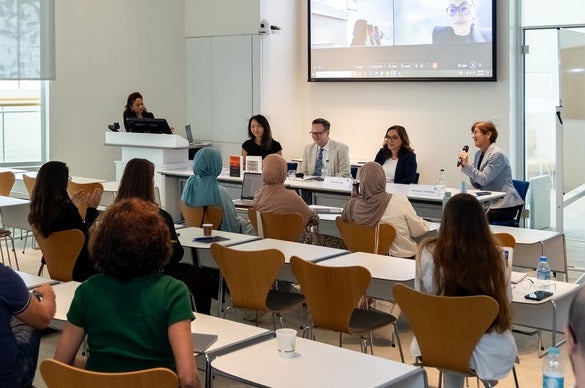
College of Law Hosts Discussion on International Law in Times of Armed Conflict
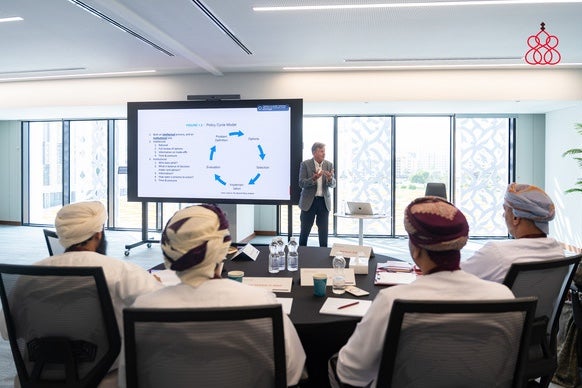
HBKU and Royal Academy of Management Deliver Module for 20 Omani Government Directors General
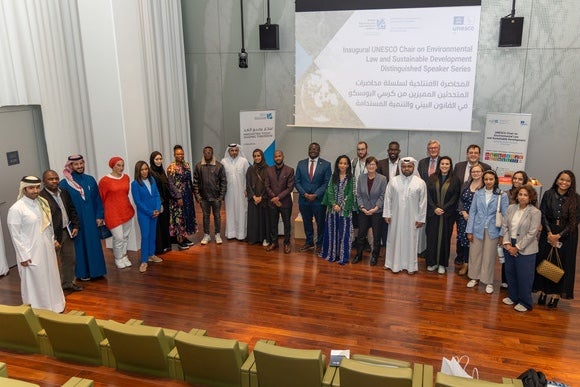
UNESCO Chair on Environmental Law and Sustainable Development Hosts President & CEO of The ONE Campaign
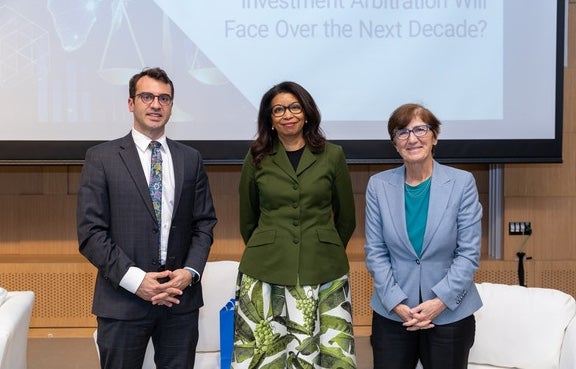
College of Law and GU-Q Co-Host Talk on Challenges Facing Investment Arbitration

College of Law Hosts Discussion on International Law in Times of Armed Conflict

HBKU and Royal Academy of Management Deliver Module for 20 Omani Government Directors General

UNESCO Chair on Environmental Law and Sustainable Development Hosts President & CEO of The ONE Campaign

College of Law and GU-Q Co-Host Talk on Challenges Facing Investment Arbitration

College of Law Hosts Discussion on International Law in Times of Armed Conflict

HBKU and Royal Academy of Management Deliver Module for 20 Omani Government Directors General

UNESCO Chair on Environmental Law and Sustainable Development Hosts President & CEO of The ONE Campaign

College of Law and GU-Q Co-Host Talk on Challenges Facing Investment Arbitration

College of Law Hosts Discussion on International Law in Times of Armed Conflict

HBKU and Royal Academy of Management Deliver Module for 20 Omani Government Directors General

UNESCO Chair on Environmental Law and Sustainable Development Hosts President & CEO of The ONE Campaign

College of Law and GU-Q Co-Host Talk on Challenges Facing Investment Arbitration

College of Law Hosts Discussion on International Law in Times of Armed Conflict

HBKU and Royal Academy of Management Deliver Module for 20 Omani Government Directors General

UNESCO Chair on Environmental Law and Sustainable Development Hosts President & CEO of The ONE Campaign

College of Law and GU-Q Co-Host Talk on Challenges Facing Investment Arbitration

College of Law Hosts Discussion on International Law in Times of Armed Conflict

HBKU and Royal Academy of Management Deliver Module for 20 Omani Government Directors General

UNESCO Chair on Environmental Law and Sustainable Development Hosts President & CEO of The ONE Campaign

College of Law and GU-Q Co-Host Talk on Challenges Facing Investment Arbitration

College of Law Hosts Discussion on International Law in Times of Armed Conflict

HBKU and Royal Academy of Management Deliver Module for 20 Omani Government Directors General

UNESCO Chair on Environmental Law and Sustainable Development Hosts President & CEO of The ONE Campaign

College of Law and GU-Q Co-Host Talk on Challenges Facing Investment Arbitration

College of Law Hosts Discussion on International Law in Times of Armed Conflict

HBKU and Royal Academy of Management Deliver Module for 20 Omani Government Directors General

UNESCO Chair on Environmental Law and Sustainable Development Hosts President & CEO of The ONE Campaign

College of Law and GU-Q Co-Host Talk on Challenges Facing Investment Arbitration

College of Law Hosts Discussion on International Law in Times of Armed Conflict

HBKU and Royal Academy of Management Deliver Module for 20 Omani Government Directors General

UNESCO Chair on Environmental Law and Sustainable Development Hosts President & CEO of The ONE Campaign

College of Law and GU-Q Co-Host Talk on Challenges Facing Investment Arbitration

College of Law Hosts Discussion on International Law in Times of Armed Conflict

HBKU and Royal Academy of Management Deliver Module for 20 Omani Government Directors General

UNESCO Chair on Environmental Law and Sustainable Development Hosts President & CEO of The ONE Campaign

College of Law and GU-Q Co-Host Talk on Challenges Facing Investment Arbitration

College of Law Hosts Discussion on International Law in Times of Armed Conflict

HBKU and Royal Academy of Management Deliver Module for 20 Omani Government Directors General

UNESCO Chair on Environmental Law and Sustainable Development Hosts President & CEO of The ONE Campaign

College of Law and GU-Q Co-Host Talk on Challenges Facing Investment Arbitration

College of Law Hosts Discussion on International Law in Times of Armed Conflict

HBKU and Royal Academy of Management Deliver Module for 20 Omani Government Directors General

UNESCO Chair on Environmental Law and Sustainable Development Hosts President & CEO of The ONE Campaign

College of Law and GU-Q Co-Host Talk on Challenges Facing Investment Arbitration

College of Law Hosts Discussion on International Law in Times of Armed Conflict

HBKU and Royal Academy of Management Deliver Module for 20 Omani Government Directors General

UNESCO Chair on Environmental Law and Sustainable Development Hosts President & CEO of The ONE Campaign

College of Law and GU-Q Co-Host Talk on Challenges Facing Investment Arbitration

College of Law Hosts Discussion on International Law in Times of Armed Conflict

HBKU and Royal Academy of Management Deliver Module for 20 Omani Government Directors General

UNESCO Chair on Environmental Law and Sustainable Development Hosts President & CEO of The ONE Campaign

College of Law and GU-Q Co-Host Talk on Challenges Facing Investment Arbitration

College of Law Hosts Discussion on International Law in Times of Armed Conflict

HBKU and Royal Academy of Management Deliver Module for 20 Omani Government Directors General

UNESCO Chair on Environmental Law and Sustainable Development Hosts President & CEO of The ONE Campaign

College of Law and GU-Q Co-Host Talk on Challenges Facing Investment Arbitration

College of Law Hosts Discussion on International Law in Times of Armed Conflict

HBKU and Royal Academy of Management Deliver Module for 20 Omani Government Directors General

UNESCO Chair on Environmental Law and Sustainable Development Hosts President & CEO of The ONE Campaign

College of Law and GU-Q Co-Host Talk on Challenges Facing Investment Arbitration

College of Law Hosts Discussion on International Law in Times of Armed Conflict

HBKU and Royal Academy of Management Deliver Module for 20 Omani Government Directors General

UNESCO Chair on Environmental Law and Sustainable Development Hosts President & CEO of The ONE Campaign

College of Law and GU-Q Co-Host Talk on Challenges Facing Investment Arbitration

College of Law Hosts Discussion on International Law in Times of Armed Conflict

HBKU and Royal Academy of Management Deliver Module for 20 Omani Government Directors General

UNESCO Chair on Environmental Law and Sustainable Development Hosts President & CEO of The ONE Campaign

College of Law and GU-Q Co-Host Talk on Challenges Facing Investment Arbitration

College of Law Hosts Discussion on International Law in Times of Armed Conflict

HBKU and Royal Academy of Management Deliver Module for 20 Omani Government Directors General

UNESCO Chair on Environmental Law and Sustainable Development Hosts President & CEO of The ONE Campaign

College of Law and GU-Q Co-Host Talk on Challenges Facing Investment Arbitration

College of Law Hosts Discussion on International Law in Times of Armed Conflict

HBKU and Royal Academy of Management Deliver Module for 20 Omani Government Directors General

UNESCO Chair on Environmental Law and Sustainable Development Hosts President & CEO of The ONE Campaign

College of Law and GU-Q Co-Host Talk on Challenges Facing Investment Arbitration

College of Law Hosts Discussion on International Law in Times of Armed Conflict

HBKU and Royal Academy of Management Deliver Module for 20 Omani Government Directors General

UNESCO Chair on Environmental Law and Sustainable Development Hosts President & CEO of The ONE Campaign

College of Law and GU-Q Co-Host Talk on Challenges Facing Investment Arbitration

College of Law Hosts Discussion on International Law in Times of Armed Conflict

HBKU and Royal Academy of Management Deliver Module for 20 Omani Government Directors General

UNESCO Chair on Environmental Law and Sustainable Development Hosts President & CEO of The ONE Campaign

College of Law and GU-Q Co-Host Talk on Challenges Facing Investment Arbitration

College of Law Hosts Discussion on International Law in Times of Armed Conflict






